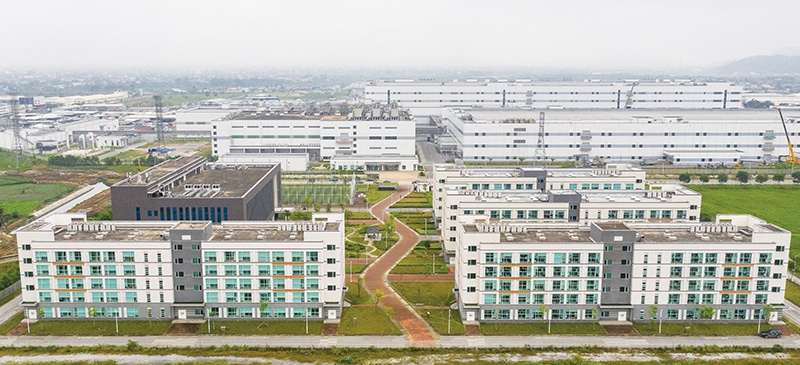IZ groups clamour for accommodation
 |
| Vietnam boasts nearly 400 IZs and thousands of industrial clusters, attracting millions of workers. Photo: Duc Thanh |
Taiwanese group Weitai Halong Garment Textile Co., Ltd. is recruiting 700 labourers for its second factory in Viet Hung Industrial Zone (IZ) in the northern province of Quang Ninh, with the hi-end sporting cap and hat manufacturing factory expected to start operations next month.
SuperCap Group – the parent company of Weitai Halong – also has plans to take a lighting equipment manufacturing factory in Viet Hung IZ into operation in mid-2022, and recruit 1,700 workers here. But the company is concerned over the ability to recruit such high numbers as it cooperates with local authorities and training facilities in the province to set up a functional system for new employees.
Vu Quang Truc, deputy director of Quang Ninh Department of Labour, Invalids and Social Affairs, said that arranging accommodation is one of the most difficult aspects of labour recruitment to solve.
“Almost all workers live in rented rooms with poor living standards. Besides that, companies have to spend large amounts hiring shuttle buses for transporting employees. Numerous employers have asked the province to hand over land funds for building housing areas for workers,” Truc said. “The province agrees with them and we are cooperating with relevant authorities to arrange such a land fund for them,” Truc said.
In reality, many manufacturers have benefited from being proactive in building housing areas and other infrastructure for their employees. Lee & Man Paper Vietnam, a fully foreign-owned paper manufacturer in the Mekong Delta province of Hau Giang, invested VND380 billion ($16.52 million) in a housing area with four buildings and over 400 apartments, suitable for 1,500 employees. A company’s representative told VIR, “In the housing area there are other utilities such as a cafeteria, training room, football field, gym, and table tennis and billiards areas. This helps create an ideal living and working environment for employees.”
The representative added that the company has maintained a stay-at-work model at full capacity, and has reported zero COVID-19 infections.
However, not all businesses have been so lucky or proactive. The pandemic has exacerbated these issues, with many struggling to take care of both food and accommodation for thousands of workers under stay-at-work production models. Many businesses as a result simply had to stop production entirely or severely reduce capacity because they could not meet the model’s conditions.
Meanwhile, other businesses have been forced to hire out hotels for employees at great expense in order to avoid operational disruption.
Local authorities cannot also hand over land funds to all and sundry. In the southern province of Dong Nai, the demand for housing for workers is large and enterprises are willing to invest money to build accommodation, but land is often not available.
Taekwang Vina JSC, based in Dong Nai, makes shoes for export and assembles products for brands like Nike with capacity of approximately 40,000 employees. Dinh Sy Phuc, chairman of the company’s Trade Union, told VIR that the company had the idea to build dorms near the factory many years ago. At the time, the company worked with local authorities to arrange a land fund for the housing project, but failed to come to an agreement.
“The company entered Vietnam more than 20 years ago but before 2005, IZs were not planned to have infrastructure for housing, schools or medical facilities to support employees,” Phuc said.
According to statistics from the Ministry of Planning and Investment, by the end of May this year the country boasted nearly 400 IZs and thousands of industrial clusters, attracting millions of workers. However, the whole country has only 214 official social housing projects for workers, at a scale of about 600 hectares.
Of those, only 116 projects have been completed, or around 250ha. In IZs, housing areas are currently only enough to accommodate around 330,000 people, meeting about 40 per cent of the 2020 target of housing workers in IZs, according to the Ministry of Construction.
Le Hoang Chau, chairman of the Ho Chi Minh City Real Estate Association said, “Many workers are migrants from poor localities, and if there is no stable accommodation they will have to leave their place of work to return to their hometowns when there are incidents. The pandemic illustrated the disadvantages of lack of accommodation for employees, making it hard for enterprises to maintain a stay-at-work model, leading to disruption of operations.”
What the stars mean:
★ Poor ★ ★ Promising ★★★ Good ★★★★ Very good ★★★★★ Exceptional
 Tag:
Tag:
Related Contents
Latest News
More News
- An Phat 5 Industrial Park targets ESG-driven investors in Hai Phong (January 26, 2026 | 08:30)
- Decree opens incentives for green urban development (January 24, 2026 | 11:18)
- Public investment is reshaping real estate’s role in Vietnam (January 21, 2026 | 10:04)
- Ho Chi Minh City seeks investor to revive Binh Quoi–Thanh Da project (January 19, 2026 | 11:58)
- Sun Group launches construction of Rach Chiec sports complex (January 16, 2026 | 16:17)
- CEO Group breaks ground on first industrial park in Haiphong Free Trade Zone (January 15, 2026 | 15:47)
- BRIGHTPARK Entertainment Complex opens in Ninh Binh (January 12, 2026 | 14:27)
- Ho Chi Minh City's industrial parks top $5.3 billion investment in 2025 (January 06, 2026 | 08:38)
- Why Vietnam must build a global strategy for its construction industry (December 31, 2025 | 18:57)
- Housing operations must be effective (December 29, 2025 | 10:00)






















 Mobile Version
Mobile Version